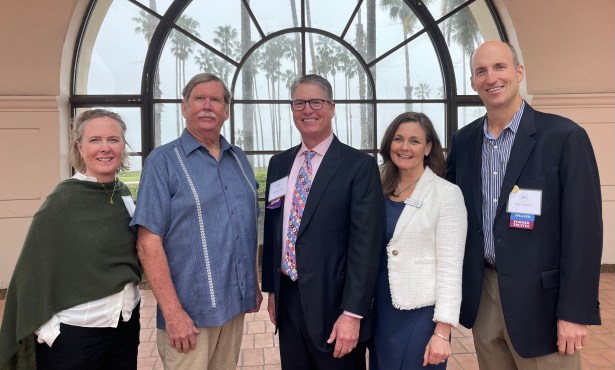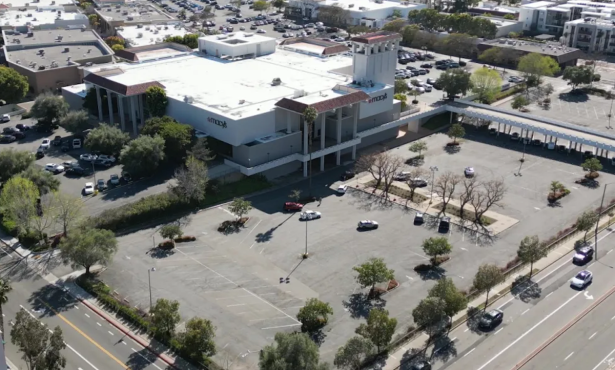Working Together
Solving the Problem of the Proposed CHP Location
Last December, a week before a state-organized public comment session on the relocation of the local California Highway Patrol station from Calle Real to 7780 Hollister Avenue, an opposition group leader urged a massive turnout at the Goleta Valley Community Center.
“We need to occupy every seat in the 250-seat auditorium,” Robert K. Miller emailed the approximately 500 supporters of the Westside Goleta Coalition. “It is the most important thing we can do to convince the state to build elsewhere.”

The targeted location is surrounded by residential neighborhoods, next to a planned assisted living facility, and less than 500 feet from Ellwood Elementary School. In April, Miller and a few of his neighbors at The Hideaway were outraged to learn this parcel was chosen for the CHP’s new home by the state’s General Services Department, which spearheaded acquisition of five new CHP sites in the state.
“I was angry,” recalled Mark Paolucci, a graphic design expert who lives near Miller and owns a small marketing agency in Los Angeles. “(The) plan made no sense. I wanted to help Bob with anything I could do.” His skills and drive resulted in the “2closeforcomfort” website, the digital home of the Coalition.
Another early supporter was civic activist Barbara Massey, who lives in Winchester Commons. She initially thought the group wanted organizing tips but signed on to the steering committee when she saw Miller’s determination to fight the state’s decision. “Starting (a new advocacy group) is the hardest,” she says. That is especially true if, like Miller, you just moved to a city and know few people outside your immediate neighbors.
A retired Long Beach attorney, Miller and his wife, Anne, “loved the area” for some time before they took residence in 2014. Goleta reminded him of small towns in his native Iowa, particularly the university town of Ames where he grew up. In retirement he had expected to become a legal mediator, not fight bureaucracy in Sacramento. But the situation developing literally next door to The Hideaway called for his skills in advocacy and problem solving. Local television identified him as an early critic of the proposed relocation. Meanwhile, Goleta’s councilmembers and staff were advised there was nothing they could do legally to halt the state’s move.
Miller credits other area residents with beginning what grew into a groundswell of opposition. “I wasn’t the first,” he said, citing two women, one in The Bluffs gated community, who wishes to remain anonymous, and Shithi Kamal-Heikman, who daily walks her daughter to Ellwood School.
College-educated and energetic, Kamal had circulated a petition against the relocation after the state’s intent was published in 2015. She was recruited to the WGC, joining Paolucci, Greg Brown, Margaret Connell, Tony Moore, Julie Solomon, and later Mark Kram on the steering committee.
As deadlines for comments on the CHP relocation came and went, Miller’s email list of supporters grew. Though unpaid, Miller said he felt these were his clients, and he tried to keep them informed. Because the state’s initial outreach was flawed he argued for a local meeting between General Services, the CHP commander, and the Coalition’s leaders.
“I repeatedly asked them to talk to us,” he recalled. Only six people had attended the initial public meeting last April. The state reps rejected that idea, he said, as beyond their business-as-usual protocol. “I was pretty upset about that,” he said. However, running into a stone wall did not mean there was no way around it.
Miller attended a fund-raiser and was high bidder for a private lunch with State Senator Hannah-Beth Jackson. He shared his frustration about the rejected meeting and wondered if she could help. Eventually Coalition leaders met in August with General Services representatives and the CHP’s Brandon Johnson and station chief Captain Mark D’Arelli at the Bacara.
State officials still refused to answer questions or provide new information. In contrast, the CHP officials were “clearly interested in our thoughts,” recalled Miller. “So we had a glimmer of hope from that meeting.”
Massey agrees: “We asked good questions, and they realized we weren’t stupid. They knew they couldn’t pat us on the head, and we’d go away.” That was certainly not going to happen after an anonymous donation allowed the Coalition to hire a law firm to attack the pending Draft Environmental Impact Report (DEIR).
To Massey this meeting was the first of two turning points. The second, as Miller predicted, was the public comment session on the DEIR on December 8.
Nearly 200 of the Goleta Center’s seats were filled to hear D’Arelli explain why the CHP needed larger, quakeproof quarters. More than 35 people spoke against the chosen location, though many also praised law enforcement.
Miller focused his fire on the inadequate analysis of possible sites in the DEIR. City staff was present but did not speak. Ten days later City Manager Michelle Green fired off a 20-page letter to the state punching more holes in their DEIR. She concluded the document failed the law’s requirements and its statements “are unsupportable by substantial evidence.
Then-Mayor Paula Perotte, whom Miller has described as “supportive,” had suggested to him that the city council might help the CHP identify other, better alternatives but that they had to discuss the idea first.
“My goal was to get council backing and have staff return with alternative locations,” she told me later. An initial discussion began at the council’s December 15 meeting but was postponed until January.
A welcome development early in the New Year made that idea moot. Captain D’Arelli hand-delivered a letter, dated January 6, to Miller from CHP Commissioner J.A. Farrow, the agency’s top decision-maker. Referencing the recent public meeting Farrow wrote, “I understand the community’s opposition is to the location of the office and not to the CHP … I have decided to not proceed with building a new office” at the disputed location.
Miller emailed his supporters that they had been heard “loud and clear,” adding that he had promised Captain D’Arelli help in finding an appropriate location. Having expected a fight over the final EIR, Miller wrote he was “pleased beyond words” and congratulated residents for saving their neighborhood “from inappropriate development.”
Despite the conflict’s apparently amicable ending, the fate of the contested parcel remains in the air. Miller hopes someone will purchase the six-acre property, but he has tried and so far failed to find another buyer.
Miller moved to Goleta without knowing anyone. After becoming involved in this issue, he has personally met “many wonderful people. I now feel like I’ve been part of the community for years,” he said.
To this observer, the efforts of Robert Miller and his steering committee on behalf of hundreds of Goleta families should stand as an example of what a well-led, organized group of residents can accomplish with minimal help from the City Council and staff. Perhaps citizens will emulate the Coalition’s actions if the official response is “There is nothing we can do” when other problems arise.



